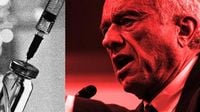On September 12, 2025, the United States found itself at a crossroads over vaccine policy and public health leadership, as a wave of state-level action swept across the country in response to radical changes at the federal level. The catalyst: Health and Human Services Secretary Robert F. Kennedy Jr., whose tenure has sparked controversy, confusion, and a patchwork of new policies from coast to coast.
Kennedy, a longtime critic of federal public health agencies, made headlines this week by calling HHS "on a 30- or 40-year decline" and labeling the US Centers for Disease Control and Prevention "a broken agency," according to CNN. When pressed by Fox News about the last great public health success, Kennedy replied, “Well, I don’t think there have been successes.” His remarks drew swift rebuke from public health professionals and historians, who point to decades of life-saving achievements led by the very agencies Kennedy now oversees.
Dr. Barron Lerner, a physician and historian at New York University, told CNN, “These are advances that take a lot of time to research and prove, and often help people who are already healthy. The accomplishments we can talk about are often on a population basis. They are proven over years and sometimes decades.”
Indeed, the historical record is robust. HHS and its agencies have overseen a dramatic drop in smoking rates—from about 42% of adults in 1965 to just 12% today, per the American Lung Association’s analysis of CDC data. The launch of Medicare Part D in 2006, after Congress created the program in 2003, brought affordable prescription drugs to tens of millions of seniors for the first time. In 1996, NIH-funded research discovered a drug combination that slashed HIV mortality by nearly half, leading to a 48% drop in AIDS-related deaths the following year. The global impact was magnified by PEPFAR, which has invested over $100 billion and helped save more than 25 million lives worldwide, according to HIV.gov.
More recently, Operation Warp Speed—an initiative of the first Trump administration—delivered Covid-19 vaccines within a year, a feat Johns Hopkins University notes would typically take five to ten years. The vaccines are credited with saving millions of American lives, the Commonwealth Fund found. Underpinning these achievements, the CDC’s Vaccines for Children program, launched in 1994, lifted vaccination rates for young kids from 60% to nearly 90% by the end of the 1990s, preventing more than a million child deaths.
Yet, Kennedy’s approach has been anything but business as usual. In June, he fired all 17 members of the CDC Advisory Committee on Immunization Practices (ACIP), the independent experts who guide vaccine recommendations for children and adults. The committee now has seven new members, with more expected to join soon. In a statement to CNN, an HHS spokesperson said, “Secretary Kennedy has been clear: the CDC has been broken for a long time. Restoring it as the world’s most trusted guardian of public health will take sustained reform. … HHS remains committed to supporting the health of the American people while respecting their right to clear, honest information and personal choice.”
The impact of Kennedy’s shake-up has reverberated well beyond Washington. Insurers and employers are now weighing whether and how to cover vaccines amid the uncertainty, Modern Healthcare reported. The resulting confusion has prompted many states—especially those led by Democrats—to take matters into their own hands.
Colorado, in particular, has moved swiftly and decisively. On September 3, state officials issued a standing order allowing pharmacists to provide COVID-19 shots without individual prescriptions, NPR reported. This followed a series of legislative changes earlier in the year: in April, the state modified its laws to allow consideration of scientific sources beyond the federal government when setting vaccine requirements for schools. Now, Colorado’s health board can consult with groups like the American Academy of Pediatrics and the American College of Obstetricians and Gynecologists, not just the CDC.
“You could see the writing on the wall that it was just becoming overly politicized rather than relying on actual science with this new HHS director,” said state Sen. Kyle Mullica, a Denver emergency department nurse and co-sponsor of the new law. “We decided to protect Colorado,” he added, so it “wouldn’t be as vulnerable to political upheaval that we’re seeing right now.”
A companion bill passed in May requires insurance plans regulated by the state to cover vaccines recommended by Colorado’s health authorities, regardless of what the CDC says. Dr. David Higgins, a pediatrician at the University of Colorado, called the move “really leading the way.” The state continues to recommend COVID-19 vaccination for pregnant individuals, following the ACIP schedule as it existed in January 2025, even after the federal government removed such recommendations. “There’s been no new evidence of issues of safety in that population,” said Dr. Ned Calonge, Colorado’s chief medical officer.
Other states have followed suit. California, Hawaii, Oregon, and Washington have formed a collaborative—the West Coast Health Alliance—to issue their own vaccine recommendations, POLITICO reported. New York’s governor declared a “statewide disaster emergency” to allow pharmacists to administer COVID-19 vaccines without a prescription, while Massachusetts now requires insurers to pay for vaccines recommended by its state health department rather than relying on the CDC.
California’s response has been particularly robust. Governor Gavin Newsom announced the West Coast Health Alliance last week, saying the CDC under Kennedy “can’t be trusted on vaccine issues right now.” The Legislature is advancing bills to freeze vaccine recommendations and insurance requirements at their January 1, 2025, levels and transfer authority for school and senior vaccine schedules from the federal ACIP to the state’s own Department of Public Health. “Anyone who was worried that RFK Jr. was going to bring his past anti-vaccine rhetoric to the administration is sweating right now,” POLITICO’s Rachel Bluth observed.
Meanwhile, President Donald Trump has been touting the COVID-19 vaccine he helped develop during his first term, even as Kennedy faces bipartisan criticism for repeating false claims about vaccine efficacy for healthy people. Recent polls from NBC and CBS News show that Americans across the political spectrum continue to strongly support vaccines, despite the turbulence at the federal level.
Yet, the uncertainty is not without consequences. As Alice Miranda Ollstein of POLITICO noted, “Regardless of state actions, tens of millions of people could lose coverage for the shots and be faced with high out-of-pocket costs, including Medicare enrollees, military members and veterans, and people on employer plans that must adhere to federal regulations.” The shift in authority from federal to state governments is unprecedented in modern public health history, raising questions about equity, access, and the future of immunization policy.
Doctors and vaccine scientists warn that the fracturing of national consensus could breed confusion and distrust. “There’s now going to be much more confusion and distrust of vaccines among the public,” said Dr. Allison Kempe, a professor of pediatrics at the University of Colorado, who previously served on ACIP. Still, many public health advocates see states’ actions as necessary to safeguard access and scientific integrity amid the federal upheaval.
As the next ACIP meeting approaches on September 18, 2025, the nation is bracing for further changes. For now, the patchwork of state responses reflects a deep divide over who should lead on public health—and what it means to protect Americans in an era of political uncertainty and scientific debate.






